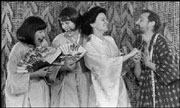THE MIKADO
Seattle Gilbert & Sullivan Society Bagley Wright Theater, 341-9612, $28: ends July 28
AS I’VE BEEN refamiliarizing myself with Wagner’s Ring in preparation for Seattle Opera’s production next month, I caught a performance of the Seattle Gilbert & Sullivan Society’s Mikado, which opened last Friday. I was more than a little surprised to notice a few odd coincidences between the two: Both center on all-powerful father figures, the Mikado (Mikado) vs. Wotan (Ring), and their disobedient children, Nanki-Poo (Mikado) vs. Brnnhilde (Ring). And, of course, both works are famous for a decorative trio of women (imagine if Gilbert had written Wagner’s libretto: “Three little maids from the Rhine are we/Pert as a water-nymph well can be,/Guarding the gold with girlish glee-ee!/Three little maids from the Rhine!”). The endings are somewhat different, though: In The Mikado, the hero Nanki-Poo at last ends up with ingenue Yum-Yum, while the Ring finishes subtly with the destruction of Valhalla, and nobody ends up with anybody.
The main strength of this Mikado (as I suspect will be the same with Seattle Opera’s Ring production) is its casting of the lead roles. A few performers had fresh and inventive takes on their characters: Ariadne Votava’s Cosmo-girl turn as Yum-Yum was a delight, as was William J. Darkow, who played bureaucrat Pooh-Bah as a big shady galoot right out of Guys and Dolls. Gerry Treacy was jolly and imposing in the title role; Richard Barrett was all wide eyes and chipmunk cheeks as Nanki-Poo (you gotta love these Teletubby names!); and David Ross was full of scheming energy as Ko-Ko (who has matrimonial designs on Yum-Yum himself). Then there was Alyce Rogers as Katisha, who really did seem to have wandered over from some Wagnerian realm. Of all The Mikado‘s characters, Katisha has to work the hardest, triangulating between villainy, pathos, and silliness, while toning down as much as possible the ridicule that librettist Gilbert tended to heap on his contralto characters, who were, stereotypically enough, almost always lovelorn old women. Rogers was not merely convincing but stunning in all three moods, thanks primarily to a soaring burnished voice and an over-the-top costume (bravo, Ron Erickson) accessorized with three-inch crimson claws.
Director Hal Ryder provided a number of clever touches throughout. It’s the custom to provide updated, topical lyrics for Ko-Ko’s “list” song (all about “society offenders . . . who never would be missed”), and Ross himself put together a particularly brilliant rewrite, including a reference to a certain local Japanese athlete. The Act 2 madrigal had some hilarious and subtle byplay with a tray of Seattle’s Best Coffee. Dannul Dailey provided some swell choreography, including stylized martial-arts moves for the opening men’s chorus and three sword-wielding samurai and a ribbon dancer for moments of spectacle.
Not all the details had yet gelled on opening night. The orchestra was a surprise, less solid (especially intonation-wise) than in previous G&S Society productions. It was a smallish group, miked to compensate—but I’ll take a thin sound over a canned one any day. The men’s chorus sounded strong but wasn’t quite at ease on stage yet. In fact, the overall tone of the show felt a little on the loose side. Gilbert’s book sends up rigid, stratified social custom (Victorian England transparently disguised as medieval Japan)—it’s all about lovesick characters tangled up in ridiculously complex laws and tripped up by deference to authority—and the casual atmosphere, though engaging, tended to weaken this point. Doug Tingvall, nicely schoolmasterish as miscellaneous nobleman Pish-Tush, carried an air of formality that was the only suggestion that any of the characters had anything to rebel against.
Come to think of it, maybe The Mikado‘s more like The Marriage of Figaro than anything else: a self-contained little jewel box of a world in which everyone’s supposed to know their place but where love confuses the issue. The main fun for the audience is actually in watching the struggle between mores and amore.







